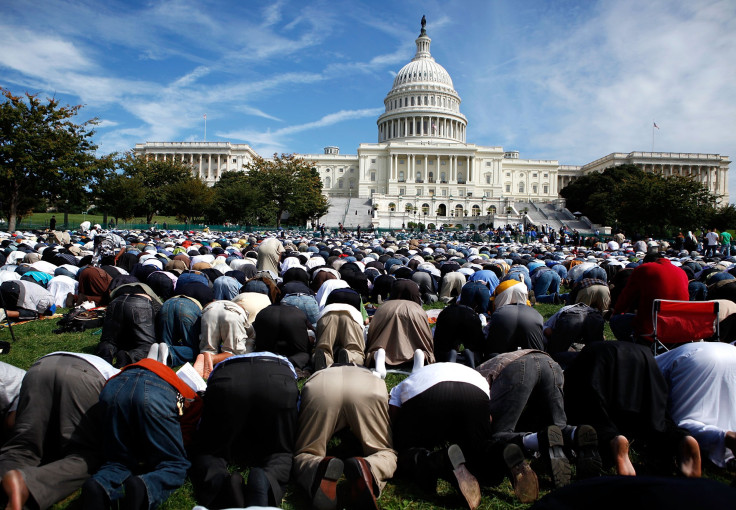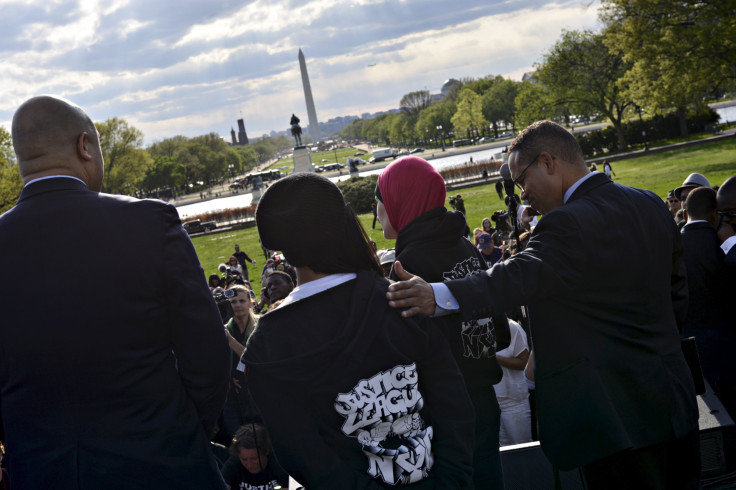Muslims Want To Influence US Elections, But Without Big Donors, Can They Make A Difference?

As Donald Trump and other political candidates attack Muslims, further fueling anti-Muslim sentiments in the United States, Muslim-American groups are ramping up efforts to get their communities politically involved. But without big donors funding their interests and demanding lawmakers' attention, some Muslims are finding themselves struggling to gain political footing at a national level.
For years, Muslim-Americans have defended themselves against bias in the United States, but many of these efforts have focused on developing partnerships and educating neighbors in local communities. As Muslims turn their attention to the 2016 election and candidates like Trump continually use anti-Muslim rhetoric, they are finding that the small size and diversity of their community may make it difficult to wield the financial clout other minority groups have.
“There are very few Muslims who understand what super PACs are. There are very few Muslim bundlers,” said Muqtedar Khan, a professor of political science at the University of Delaware who has written about Muslim-American political involvement in the U.S. “Rich and influential Muslim leaders will have fundraisers at their homes,” Khan added, but the practice is not very common.
Minority groups in the United States such as Jews, African-Americans and Latinos traditionally get involved in politics as communities to advocate for issues important to their group. Christian religious groups, though not minorities, also work to influence politics in favor of causes they deem important. But in Washington, it's not enough to organize. Interest groups with money bankroll like-minded candidates and fund political advertisements to get results.
As Jews started to become politically involved, they initially stayed behind the scenes in strategy roles or running in local elections. Even in 2000 and 2004, when former Sen. Joe Lieberman, D-Conn., ran for office, many Jews worried that having a Jew in such a prominent position might spark a new wave of anti-Semitism.
But in recent years, Las Vegas casino magnate Sheldon Adelson has become one of the nation's largest donors to political campaigns, and Jewish lobbying groups have often shaped debates in Washington. As a prominent member of the Jewish community, Adelson has also been able to recruit other Jews to donate to his favorite candidates. Just last week, Republican presidential candidates spoke at an event sponsored by Adelson’s signature group, the Republican Jewish Coalition, to curry the favor of donors who could give out many millions this election cycle.
“A lot of the idea of Jews [being comfortable] was taken from the Black Power Movement of the 1960s. When they said ‘Black is beautiful,’ people thought it’s OK to be ethnic, so Jews said that 'Jewish is beautiful, the Irish said Irish is beautiful',” said Marc Dollinger, a professor of Jewish studies at San Francisco State University. “But Jews enjoy access as a white group for the most part. They’ve joined the middle class, they haven’t faced what the black community has faced, what other communities of color have faced.”
Though African-Americans and Hispanic-Americans still experience a great deal of discrimination, they have also developed fundraising mechanisms and organizations that allow them to elect politicians who come from their communities. As a result, presidential candidates have met recently with Hispanic groups and lawmakers this election cycle, as well as groups such as the NAACP and the Black Lives Matter social justice movement.
For Muslims, however, there are just two members of their faith in Congress, and there is no equivalent of the Republican Jewish Coalition or other super PACs that can raise large sums of money for political candidates. There are Muslim advocacy groups like the Council on Islamic-American Relations, the Muslim Public Affairs Council and Emerge USA, which focus on pushing for Muslim-friendly policies or fighting back against stereotypes and discrimination. But these organizations are largely focused on grassroots engagement and not on fundraising money to donate to campaigns or candidates.
There were a few Muslim PACs in the early 2000s, when Muslims came out to vote for George W. Bush and saw a wave of anti-Muslim bias after the Sept. 11 attacks, but most have withered away and few raised more than several thousand dollars -- a small drop compared to the large sums being given away by other groups. Since then, Muslims have shifted their voting patterns to become a reliably Democratic bloc, but this has not brought them more weight.
One of the most basic reasons Muslims have struggled to develop a larger political infrastructure is because of the small size of their community. Muslim-Americans make up 0.9 percent of the U.S. population, according to the Pew Research Center, but the number of Muslim immigrants in the U.S. is growing.
This means that there are fewer Muslim-Americans who have political experience and understand how to get involved in U.S. politics. It can also mean that although Muslims in one U.S. city might attend the same mosque, they may be from different parts of the world, hold different priorities and speak different languages.
“They’re too focused on the elections in Turkey or the Syrian refugee crisis to focus on what’s happening here,” Khan, the University of Delaware professor, said. “The diversity of the Muslim community means they have too many goals and not enough people to make things happen.”
Even in more theoretical political forums, Muslims are often underrepresented. There are very few Muslim think tanks, Khan said and raising money for research or for direct political efforts can be difficult.

Another factor that can hurt Muslim-Americans’ chances of getting politically involved is the pervasiveness of a bias against Muslims, which is often the very issue they are trying to combat.
“There’s been political exclusion for quite some time -- even before 9/11 -- of American Muslims,” said Salam Al-Marayati, president of Muslim Public Affairs Council (MPAC), a prominent Muslim advocacy group. “The president, as much as he speaks highly of American Muslims, he’s rarely seen meeting with Muslims.”
Al-Marayati said lawmakers at the national level can be reticent to meet with Muslim leaders, which makes it difficult for his group and others to have the same kind of access that other advocacy organizations enjoy. When MPAC invited all the presidential candidates to a Nov. 10 public policy forum, no candidates attended.
“They fear the backlash of right-wing media and blogs because of the stereotypes. They use us as a punching bag to show that they’re being tough on terrorism,” Al-Marayati said of national lawmakers. “That unfortunately is the dominant political culture of this time, so Muslims are a bit apprehensive to engage.”
Instead of attending political forums with Muslims this fall, Trump accused them of celebrating 9/11, fellow candidate Ben Carson compared Syrian refugees -- a majority of whom are Muslim -- to rabid dogs and as recently as Monday, Trump called for a "total and complete shutdown" of Muslims entering the U.S. until the government "can figure out what is going on."
Still, Muslims recognize the need to engage politically in the 2016 election even if it seems like an uphill battle. Groups such as Al-Marayati’s and the Council on American-Islamic Relations continue to stake out a prominent place in responding to anti-Muslim rhetoric, forging connections with civic leaders and encouraging young Muslims to register to vote. Earlier this fall, a coalition of Muslim-American groups launched a voter registration campaign to sign up 20,000 new voters by the Super Tuesday primaries in March.
“There is a sense of urgency and of ramping up our efforts to engage our communities around these issues,” said Rabiah Ahmed of MPAC. “You definitely see the Muslim community being more engaged in this because if we don’t the situation is only going to become more bleak.”
© Copyright IBTimes 2025. All rights reserved.






















